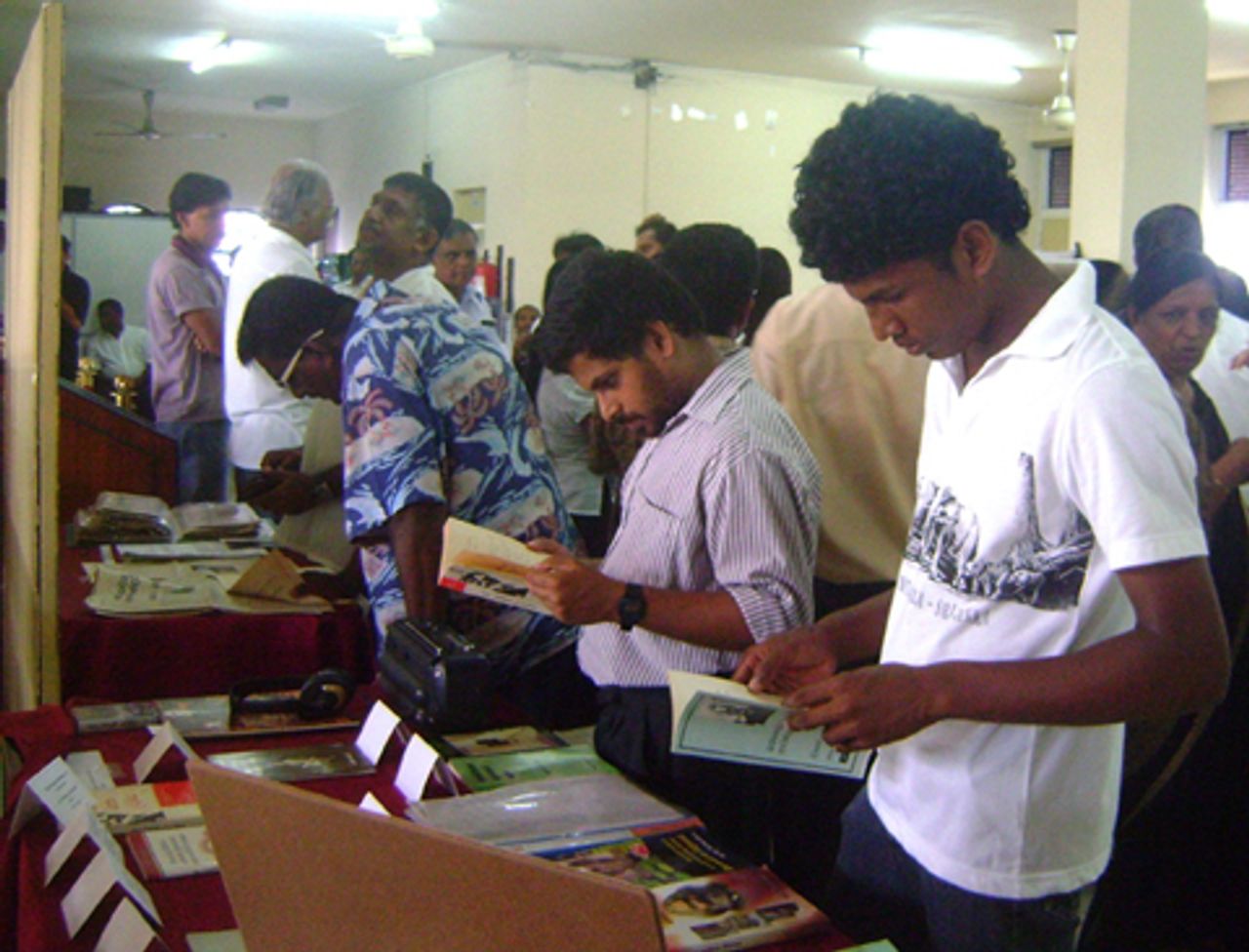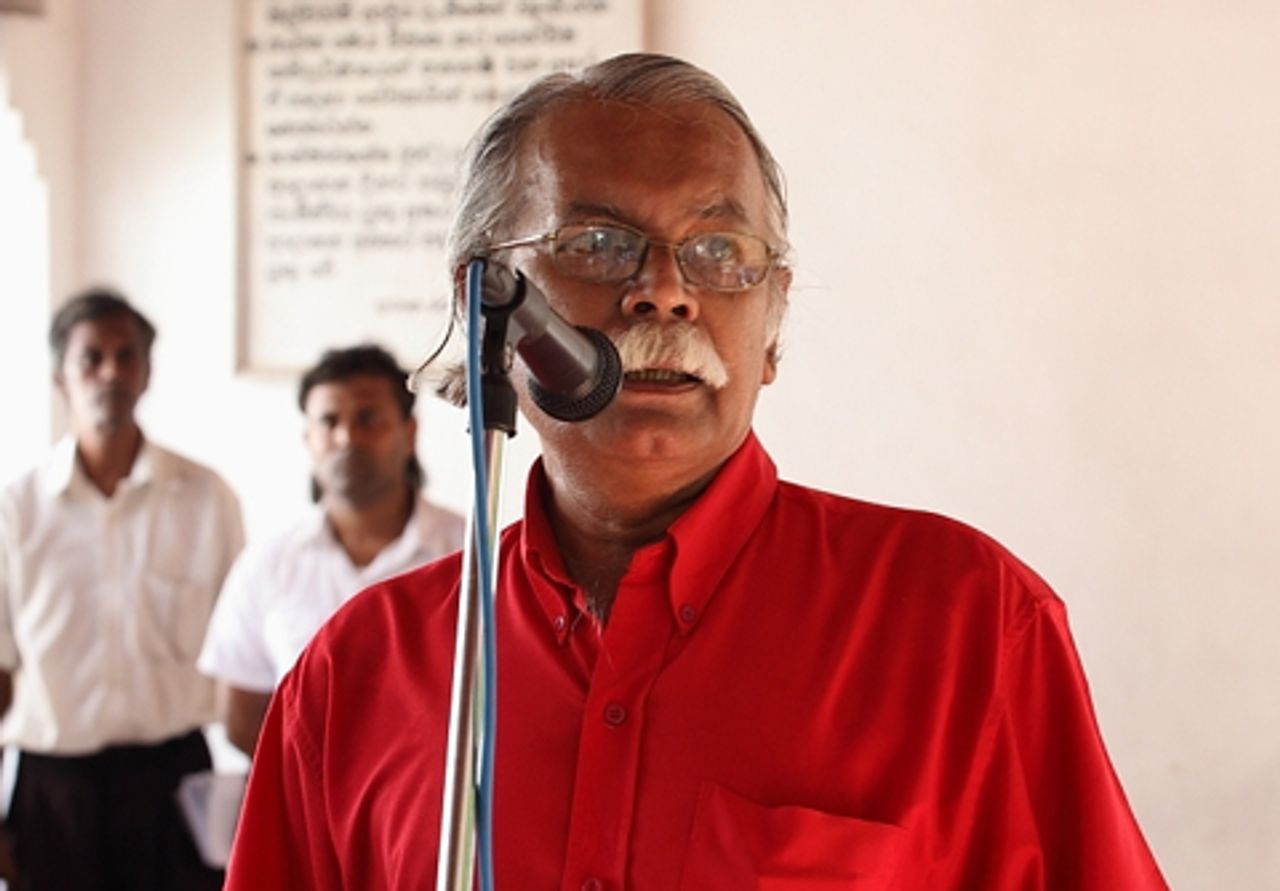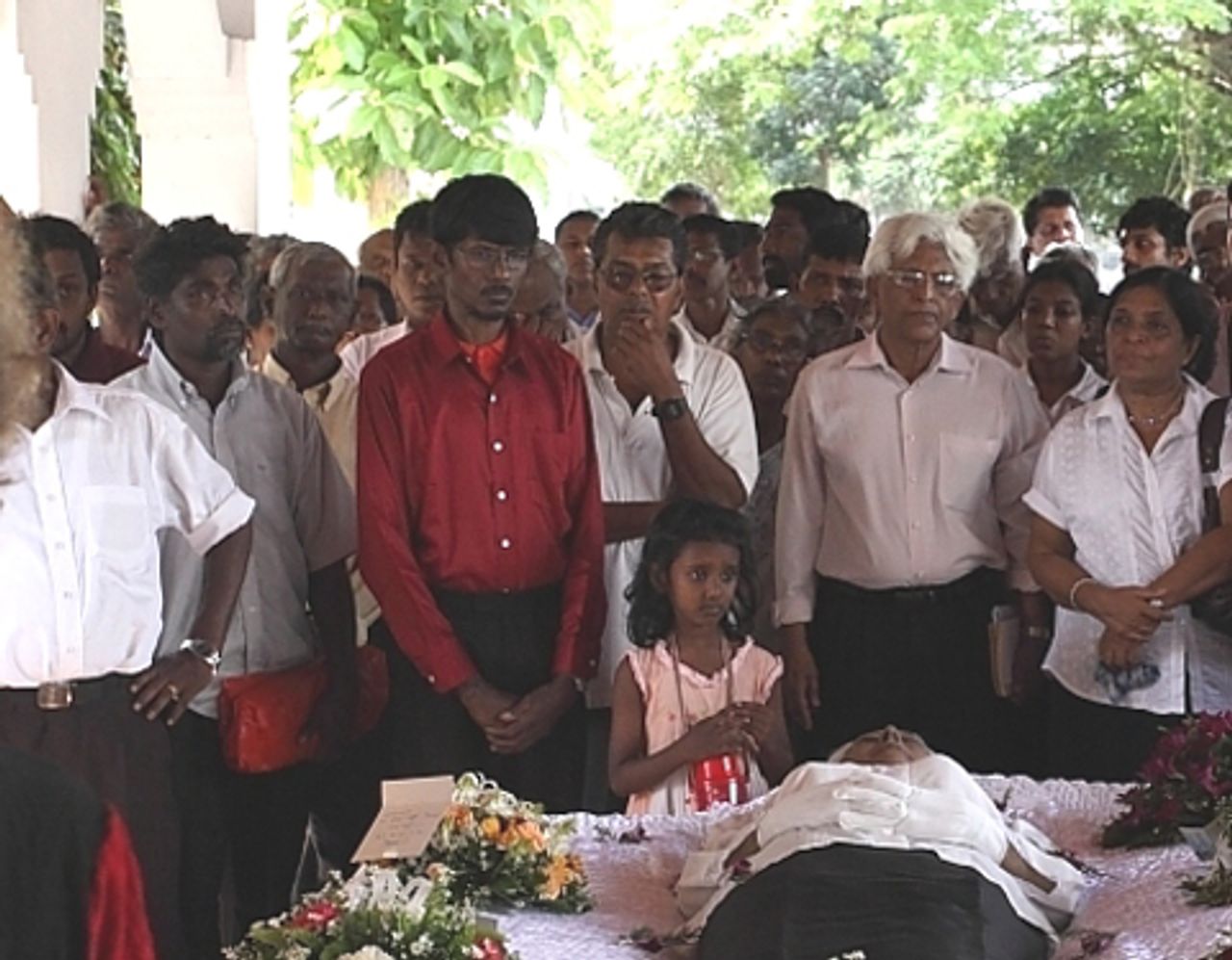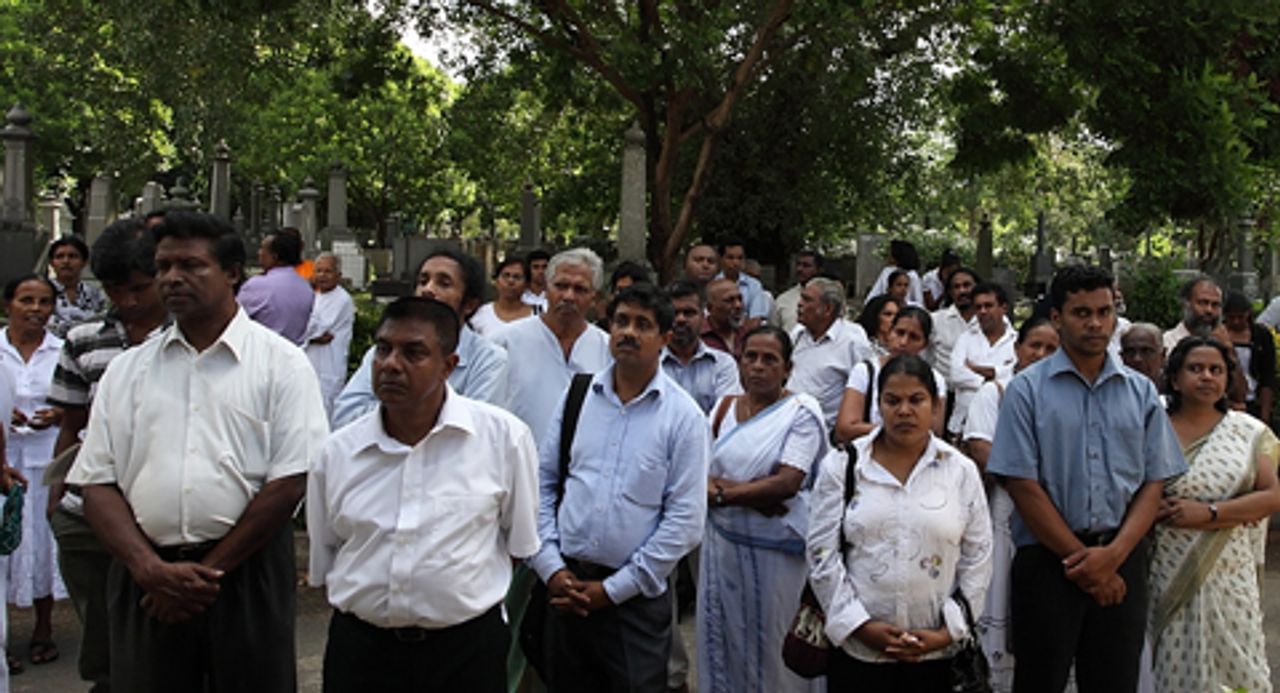About 500 people attended the funeral of comrade Piyaseeli Wijegunasingha, a member of the Socialist Equality Party (SEP) in Sri Lanka, on September 6. They included representatives of the sections of the International Committee of the Fourth International (ICFI), SEP members and supporters, family members, former academic colleagues and students at the University of Colombo, intellectuals, film directors and artists.
In bringing condolences from the ICFI to the Sri Lankan SEP, David North, chairman of the International Editorial Board of the World Socialist Web Site and National Chairman of the SEP (US) said that Piyaseeli’s death was “an irreplaceable loss”. “Here we have gathered not only to mourn but to celebrate an extraordinary life, which ended too early... Piyaseeli was active intellectually and politically until the moment she went to the hospital,” North said.
Piyaseeli, a lifelong Trotskyist, died suddenly on the morning of September 2 at the age of 67 following surgery for breast cancer at a Colombo hospital. She was the wife of SEP General Secretary Wije Dias.
Piyaseeli was a leading figure in the fight for Marxist literary criticism in Sri Lanka. She worked as a lecturer in the Sinhala Department of the University of Colombo for over four decades. She was appointed professor and head of the Department of Sinhala Literature in 1997 and retired in January last year.
Virtually every newspaper in Sri Lanka published reports of Piyaseeli’s death, indicating the broad influence and impact of her work. Several carried lengthy articles explaining her views and her role as a critic of art and literature. The national television network, Rupavahini, also reported her death.
 Mourners studying Piyaseeli's literature
Mourners studying Piyaseeli's literatureHundreds of people paid their respects at Jayaratna Florists funeral parlour in Colombo, where Piyaseeli’s body was laid in state from the evening of September 2 until the day of the funeral. Many wrote in the condolence book expressing their appreciation for her work as a Trotskyist, a literary critic and dedicated teacher.
Piyaseeli’s books on Marxist literary criticism, as well as her arts reviews and translations of the works of Leon Trotsky and the International Committee of the Fourth International were on display. Next to her body were floral wreaths from the ICFI and its sections. The SEP refused to accept a wreath brought to the funeral parlour by an army official on behalf of Sri Lankan President Mahinda Rajapakse.
 Wije Dias
Wije Dias
The funeral was held at the Colombo General Cemetery, following a procession from the funeral parlour. Wije Dias, who chaired the funeral proceedings, thanked the representatives of the international Trotskyist movement, SEP members and supporters and others for being present to pay their last respects.
In his speech, David North referred to an article that Piyaseeli had written in 1983, at the outbreak of the country’s long civil war, replying to Professor Karlo Fonseka from the Colombo Medical College, who had stated that violence had its biological roots in human personality. Piyaseeli had replied: “Violence does not arise, fundamentally, from human personality, but from the contradictions within society, and can only be solved by overthrowing them.”
North commented: “In fact, she was replying not only to an intellectual opponent in Sri Lanka but to a widespread international tendency, which holds a pessimistic and profoundly reactionary point of view on society and human beings... If violence arises out of the contradictions of human society, then violence can be ended by transforming that society.
“Making this argument against endless violence and civil war in Sri Lanka demonstrated an immense intellectual and moral courage from her side. Piyaseeli was a revolutionary optimist. She profoundly believed in the ability of man to transform the society. ”
North concluded his speech by stating that Piyaseeli remained “an inspiration to the international working class”.
Other international representatives were Linda Levin, Assistant National Secretary of the SEP (Australia) and Peter Symonds from the SEP (Australia). Athiyan, on behalf of Tamil supporters of the ICFI in France and Germany, and Arun Kumar, an ICFI supporter in India, also attended.
 At the funeral ceremony
At the funeral ceremonyBringing condolences from the membership of the Australian section of the ICFI to the Sri Lankan SEP and to Piyaseeli’s husband, Wije Dias, son, daughter-in-law and grand-daughter, Linda Levin said that Piyaseeli was part of an extraordinary generation in Sri Lanka that had been won to Trotskyism in the early 1960s: “She became attracted to the great ideals, principles and perspective of revolutionary internationalism, and then committed the rest of her life, through immense political and personal difficulties and challenges, to the struggle for these principles and perspectives within her profession and within the Sri Lankan working class and among the youth.”
Levin explained that Piyaseeli was a “deeply artistic person of tremendous dignity and poise, gentleness and warmth”, but with a “formidable intellect and a steely determination and courage to fight for her convictions. She had fought for Marxist materialism against religious and idealist ideologies and their influence in literature. She also fought to defend the rights of her colleagues and students on campus.”
Levin referred to Piyaseeli’s arts reviews for the World Socialist Web Site, where she revealed her sensitivity to “the destructive transformations wrought to social relations in Sri Lanka by decades of civil war and violence and the ceaseless promotion of nationalism and communalism”. In a review of the film Pavuru Valalu (Walls Within), by Sri Lankan filmmaker Prasanna Vithanage she wrote: “Pavuru Valalu reveals the mental agony wrought on men and women alike in capitalist society generally, and particularly in backward capitalist countries, by the existing social and family system.”
Piyaseeli had concluded the review with a passage written by Leon Trotsky in 1940, just a few weeks before his assassination: “Natasha has just come up to the window from the courtyard and opened it wider so that the air may enter more freely into my room. I can see the bright green strip of grass beneath the wall, and the clear blue sky above the wall, and sunlight everywhere. Life is beautiful. Let the future generations cleanse it of all evil, oppression and violence, and enjoy it to the full.”
Levin commented: “These words...are a powerful expression of the sentiments that animated comrade Piyaseeli’s life and work.”
 A section of the crowd at funeral ceremony
A section of the crowd at funeral ceremonyWije Dias read the messages of condolence sent by Ulrich Rippert and Peter Schwartz on behalf of the Partei für Soziale Gleichheit (PSG) in Germany, Chris Marsden on behalf of the SEP in Britain, and Keith Jones on behalf of the SEP in Canada. (See: “International condolences on the death of Sri Lankan Trotskyist”)
Athiyan brought the condolences of ICFI comrades and supporters in France. “Losing a very important and brilliant comrade at a decisive moment in history is a very sad thing. Today we are here as a result of the powerful political and theoretical struggle waged by Piyaseeli and other comrades of the RCL in the 1960s,” he said.
“We are entering into a decisive and important period, in which we have immense political and theoretical work to conduct. Under these circumstances, the demise of comrade Piyaseeli is a great loss for us. We will remain part of the struggle of the ICFI.”
Professor Sarath Wijesuriya from the Sinhala Department of the University of Colombo also addressed the gathering. He recalled that as a student of Piyaseeli in Sinhala literature she had been the figure “who had the most meaningful influence on us of all our university lecturers... We understood as students that her enormous knowledge was generated by the study of literature based upon the political ideology she believed in. We all agreed that her political ideology helped her to work as a mature literary critic.”
Kapila Fernando, the convenor of the International Students for Social Equality (ISSE) in Sri Lanka, highlighted the significance of the political and theoretical struggle waged by Piyaseeli for Marxism, while the majority of academics propagated capitalist ideology. “It was against the reactionary propaganda that ‘socialism is dead’ following the breakdown of the Soviet Union that Piyaseeli fought to defend the program and perspective of socialism.”
Referring to the struggle to build the ISSE in Sri Lanka, Fernando said: “Many students we have met said that they learnt to see the world materialistically through studying Piyaseeli’s works.”
K. Ratnayake, a member of the SEP Political Committee, spoke on behalf of the party and concluded the speeches. “Today we are taking our leave physically of a comrade who dedicated her life to her work as a Marxist art critic and a very firm fighter for the program of world socialist revolution. But her ideas remain.”
Ratnayake cited a newspaper article that had described Piyaseeli as an “iron woman”. “She was characterised as such because she came forward to fight for the Trotskyist principles that she believed in without compromise. Her great strength was fighting against idealist ideologies, including the influence of Buddhism in literature and art, on the basis of materialism.”
He said that her death had taken place against the backdrop of a deepening world capitalist crisis and the threat of world war. As the working class came into revolutionary struggles it would need the program of world socialist revolution and the party, for which Piyaseeli fought throughout her life.
The funeral concluded with the singing of the Internationale.
The author also recommends:
Piyaseeli Wijegunasingha, a Sri Lankan Trotskyist, dies at 67
[6 September 2010]
